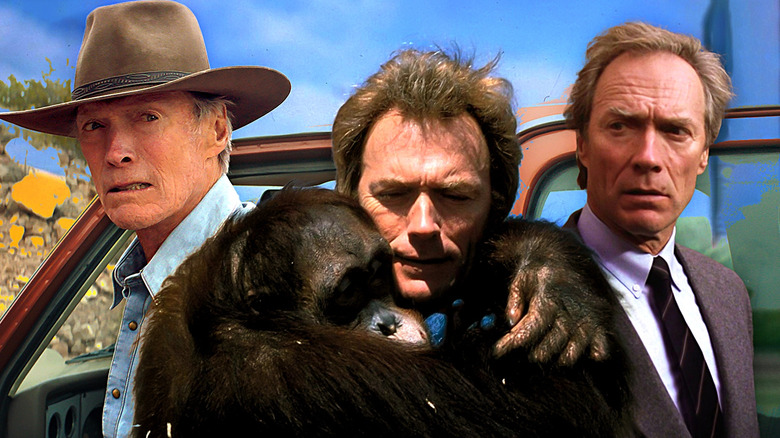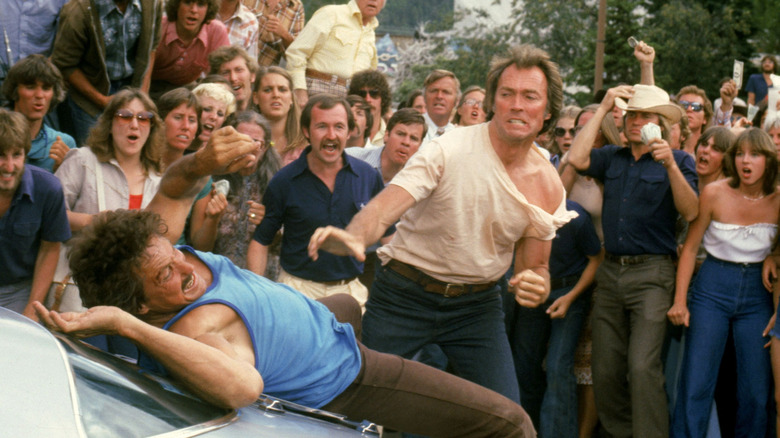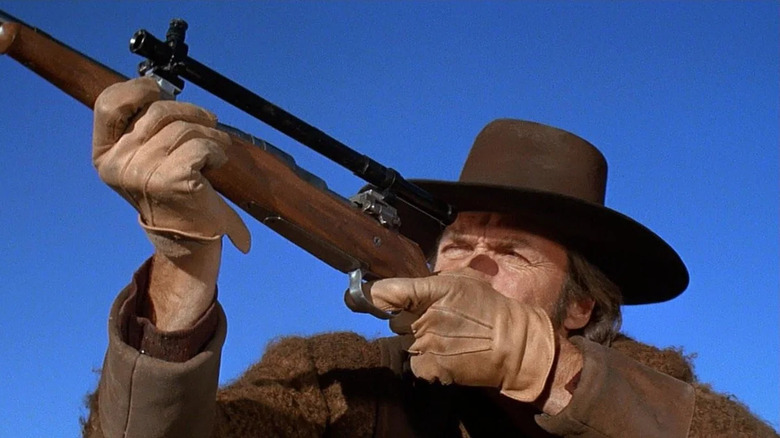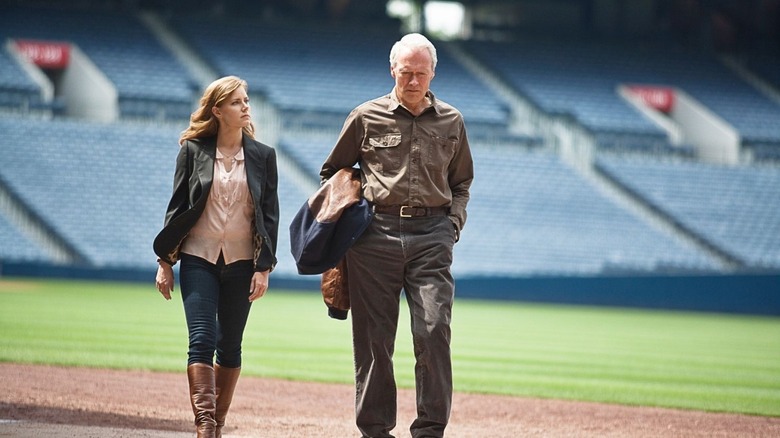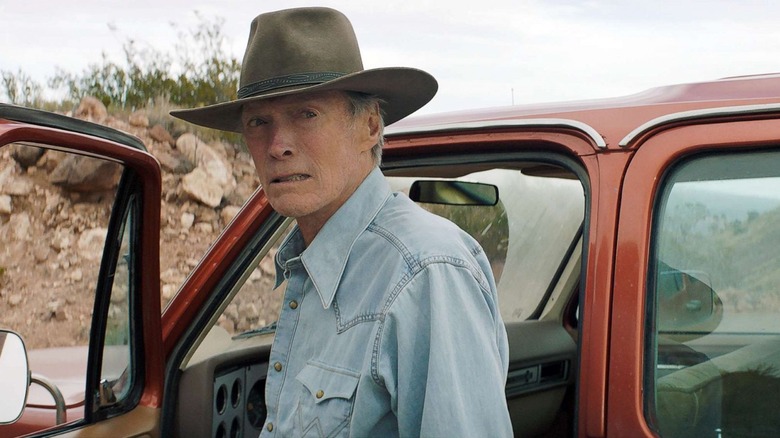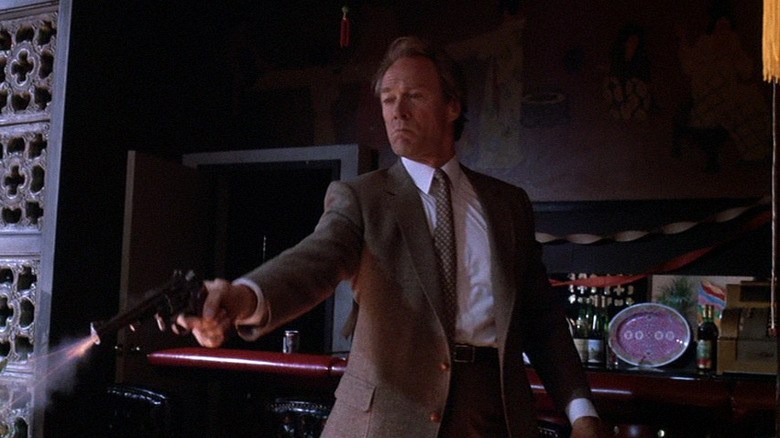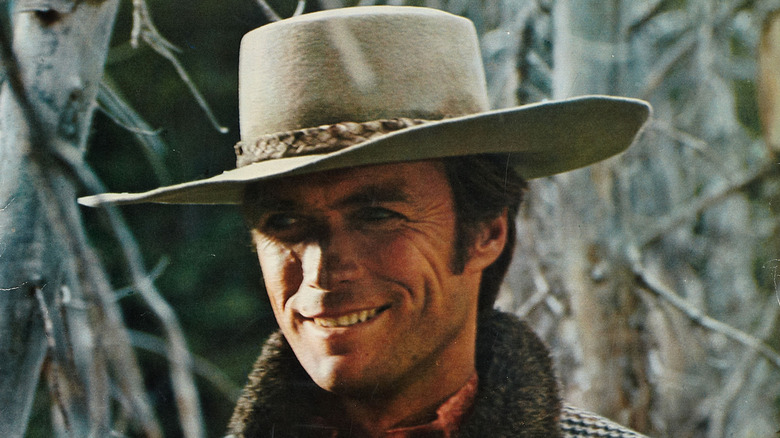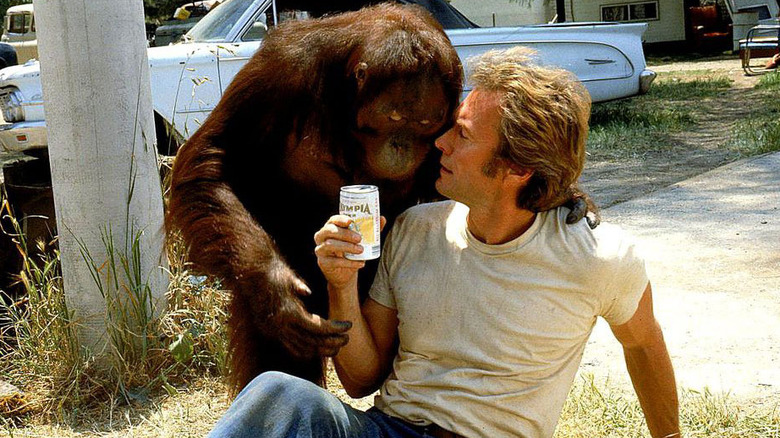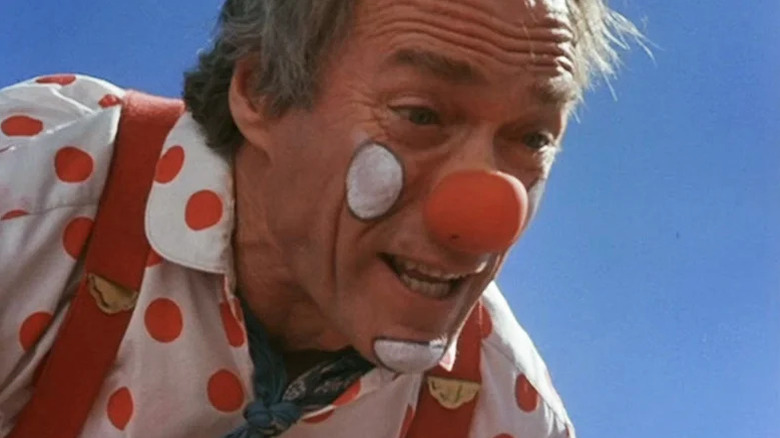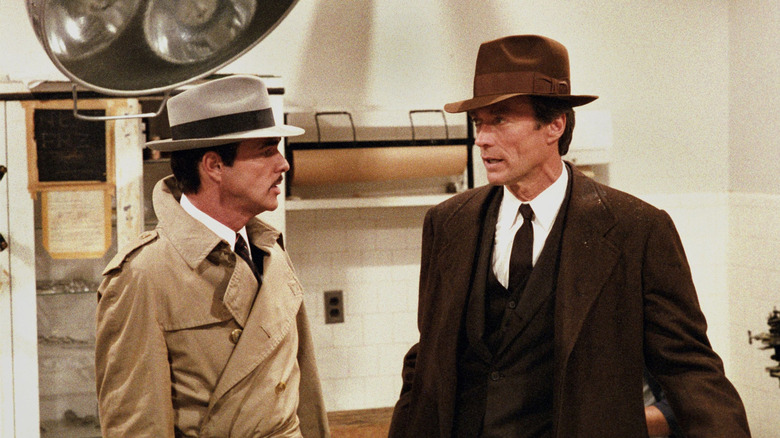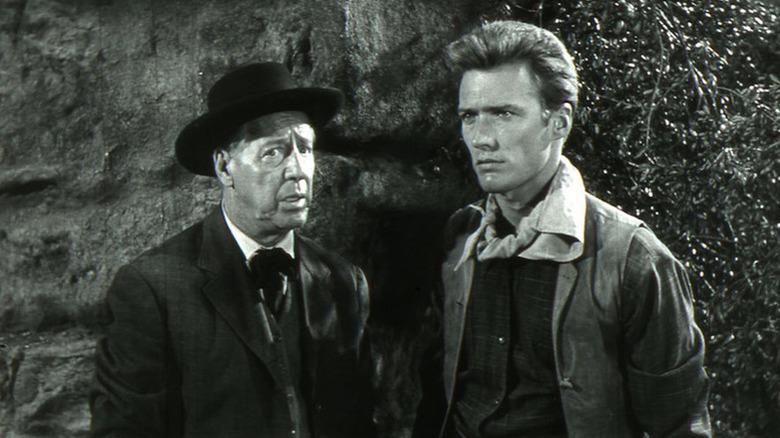The 10 Worst Clint Eastwood Movies Ranked
Clint Eastwood has been starring in and making movies since the 1950s, with his directorial work arguably on par with his iconic acting roles. Of course, anyone who's been involved in the entertainment industry for so long and so prolifically is bound to have appeared in their fair share of subpar projects. After all, even Laurence Olivier, one of the most celebrated actors of all time, starred in movies as widely reviled as 1981's "Inchon." Eastwood is no different in this regard, though, to his credit, even his weakest movie roles hold up better than Olivier's war movie folly.
Olivier aside, Eastwood has starred in some barely watchable stinkers over his extensive career which, while some have their own fans, are glaringly flawed. For those looking to revisit the highlights in Eastwood's acting filmography, these are the handful of movies to strongly consider avoiding altogether. To clarify, this list focuses on Eastwood's projects as actor rather than a director, though a couple entries have him in either a director or producer role as well.
Here are the 10 worst Clint Eastwood movies ranked descending to the weakest of them all.
Any Which Way You Can
The sequel to the box office hit "Every Which Way But Loose," 1980's "Any Which Way You Can" continues the adventures of traveling bare-knuckle brawler Philo Beddoe (Eastwood). With his pet orangutan Clyde in tow, Philo tries to leave his street fighting life behind when he realizes he's growing addicted to the pain. This is derailed when mafia-backed martial artist Jack Wilson (William Smith) challenges Philo, with the mob hoping for a huge payout from a rigged fight. To complicate matters, Philo runs into his old flame Lynn Halsey-Taylor (Sondra Locke) and a biker gang that's held a grudge against him for years.
This might be a hot take, but "Any Which Way You Can" is marginally better than its predecessor; a non-subtle hint to expect the preceding movie somewhere on this list. But the 1980 sequel features a much more exciting and visceral final bout, especially given how anti-climatic the first movie's ending is. The sequel's recurring gags are just as awkwardly delivered and run into the ground as the original, but at least the movie wisely puts a bigger spotlight on Clyde. Still a largely unfunny slog punctuated by decent fights and groovy ape, "Any Which Way You Can" put the final nail in the coffin for this two-movie series.
Joe Kidd
1972's "Joe Kidd" is another Eastwood movie that proved popular with contemporary audiences, got a lukewarm reception from critics, and has fallen into obscurity over the subsequent years. Set in the early 20th century, Eastwood plays the title character, a bounty hunter arrested for disturbing the peace in a New Mexico border town. Kidd is released after agreeing to join a posse formed to stop revolutionaries led by Luis Chama (John Saxon) targeting local landowners. However, Kidd is betrayed by the rest of the posse as they reach their quarry, but still decides to follow through with completing his agreed-upon task.
On paper, "Joe Kidd" should've been a Western as enduring and celebrated as Eastwood's "The Outlaw Josey Wales" or "High Plains Drifter." The movie was written by influential crime author Elmore Leonard and directed by prolific Western and war movie filmmaker John Sturges, in addition to starring Eastwood. But of all the stern Western gunslingers that Eastwood has played, Kidd is the most confusing in his motivations and the least interesting how he carries himself on-screen. An anemic revisionist Western that doesn't really have anything meaningful to say or keep an audience invested, "Joe Kidd" is among Eastwood's most forgettable work in the genre.
Trouble with the Curve
One of the biggest issues a movie can have is it's just plain boring. Even a poorly made flick or outright misfire has its merits as long as it's watchable. The 2012 baseball movie "Trouble with the Curve" unfortunately qualifies on the boring score, with Eastwood playing talent scout Gus Lobel at the twilight of his career. With Gus facing the growing possibility of a forced retirement, he is accompanied by his estranged daughter Mickey (Amy Adams) to help scout for fresh baseball talent. As Gus and Mickey come to terms with the difficulties in their relationship, Mickey forms a romantic relationship with Boston Red Sox scout Johnny Flanagan (Justin Timberlake).
It's not that "Trouble with the Curve" is an incompetently made movie, it's just underwhelming on every notable metric and a waste of its two lead actors. The story is completely unsurprising and predictable at every turn, with its intended big emotional beats going off as hollow and uninspired. The rapport between Eastwood and Adams is the highlight of the movie, but chemistry alone doesn't make for a good film and only gets you so far. A formulaic sports drama that feels oddly muted in its execution, "Trouble with the Curve" is more trouble than just its titular pitch.
Cry Macho
Though Eastwood's career had gotten its big break through starring in Westerns, both in television and film, he took a nearly 30-year hiatus from the genre. But Eastwood returned to Westerns with 2021's "Cry Macho," which he also directed and produced, playing retired rodeo star Mike Milo. Mike is hired by a local rancher to travel to Mexico City and bring his teenage son Rafo (Eduardo Minett) back to live with him. On the way back to the United States, Rafo and Mike bond, pondering the value of machismo as they're pursued by the Mexican authorities.
A lot of the disappointment surrounding "Cry Macho" stems from the fact that it was Eastwood's first Western starring role since the 1992 iconic movie "Unforgiven." While that may be an unfair comparison, it doesn't excuse how meandering and largely forgettable his return to the genre turned out to be. Mike and Rafo's journey feels like an existential odyssey, but nothing really interesting and substantial comes up from this introspective trek. Studios expected "Cry Macho" to be a box office flop, and seeing both its earnings and the theatrically released movie itself, they were right.
The Dead Pool
Eastwood completely redefined cop movies by starring as the iconic San Francisco police detective Harry Callahan in the popular and controversial Dirty Harry movies. The film series ended with 1988's "The Dead Pool," which has Callahan targeted by both a drug lord's hitmen and the deranged serial killer Harlan Rook (David Hunt). Rook is eliminating individuals on a list of local celebrities which was developed for people to bet on who on it will die. Among Rook's other targets is television reporter Samantha Walker (Patricia Clarkson), whom Callahan has recently grown close to.
The Dirty Harry series goes out with a whimper in what is easily the franchise's silliest movie, though Eastwood is in adequately gruff form as always. The big car chase sequence has Callahan pursued by an explosive RC car, while the climax has Callahan kill Rook not with his usual magnum but a cartoonish harpoon gun. These scenes, along with a contrived premise, make the movie feel like a self-parody and certainly a far cry from its harder-edged predecessors. Most memorable for starting Liam Neeson's Hollywood career, "The Dead Pool" heralds an embarrassing end to cinema's most famous cop who doesn't play by the rules.
Paint Your Wagon
Eastwood and Lee Marvin might not be the first two '60s actors that come to mind to star in singing roles for a movie musical. 1969's "Paint Your Wagon" underscores why that distinction is the case, with Eastwood and Marvin playing partnered up prospectors Pardner and Ben Rumson, respectively. The two men's partnership takes on a more intimate level, when both enter an openly polygamist marriage with Elizabeth (Jean Seberg). As the discovery of additional gold deposits causes the community to grow, similarly increasing greedy schemes in town, this threesome's dynamic faces new challenges.
The premise to "Paint Your Wagon" is forward-thinking enough and the on-screen chemistry between its leads is pleasant, if unspectacular. But where the movie falters and falters consistently, is in its musical numbers, with even Eastwood regretting his singing in the unconventional Western. For a movie musical that includes 14 songs, that derails the entire experience considerably, though, to his credit, Eastwood does sing markedly better than Marvin. A tone-deaf musical with an odd narrative setup, "Paint Your Wagon" is the Eastwood-led musical that most deserves to be largely forgotten.
Every Which Way But Loose
1978's "Every Which Way But Loose" was a controversial project for Eastwood, who not only starred in the movie but made it through his production studio The Malpaso Company. Eastwood stars as Philo Beddoe, a truck driver with a lucrative side hustle as a bare-knuckle brawler, often accompanied by his pet orangutan Clyde. Smitten by country singer Lynn Halsey-Taylor (Sondra Locke), Philo follows her to Denver, where the legendary brawler Tank Murdock (Walter Barnes) is also located. Along the way, Philo incurs the wrath of a comedically inept biker gang, the Black Widows, who pursue him to achieve their revenge.
Look, there are a lot of people who unironically enjoy "Every Which Way But Loose," judging by it and its sequel's box office earnings. But outside of Clyde and Philo's one-upmanship over the Black Widows, the movie isn't all that funny, made painfully evident by the fact that it constantly repeats its own jokes. The movie's emotional beats also feel hollow and awkward, something that its sequel wisely avoids, albeit not without its own aforementioned flaws. A directionless chore to get through, unfunnily shambling from one vignette to the other, "Every Which Way But Loose" is an insipidly mind-numbing watch.
Pink Cadillac
Clint Eastwood's career in the late '80s was one marked by particularly unusual acting choices after he had established himself. This includes 1989's "Pink Cadillac," with Eastwood playing bounty hunter Tommy Nowak, who is tasked with retrieving Lou Ann McGuinn (Bernadette Peters). As Tommy begins falling for Lou Ann, he learns that her husband (Timothy Carhart) leads a gang of white supremacists and has kidnapped her baby. With this knowledge in hand, Tommy agrees to fight the gang and rescue Lou Ann's baby, making the journey in a counterfeit money-loaded pink Cadillac.
For an action romantic comedy, "Pink Cadillac" comes up lacking on virtually expectation associated with its genre. The chemistry between Eastwood and Peters is largely languid and forced while the action elements aren't all that exciting, nor is Eastwood that funny. Aside from an early appearance of Jim Carrey crossing paths with Eastwood, there just isn't that much special about the movie. Utterly forgettable and poorly executed, "Pink Cadillac" is another misfire from Eastwood in his most scattershot acting period.
City Heat
On paper, a big screen pairing between Eastwood and Burt Reynolds would seem like a recipe for success in 1984. Unfortunately, the resulting collaboration, the period piece crime comedy "City Heat," proved to be anything but successful. Set in 1933, Eastwood plays Kansas City police officer Speer, who reunites with former colleague and estranged friend Mike Murphy (Reynolds). As the two men try to reconcile, they contend with love interests and unwanted attention from the city's mob.
Critically reviled upon its release, most notably by Roger Ebert, "City Heat" is a project that lets both its lead actors down considerably. Though Eastwood brought his usual gruff persona to his role, Reynolds was disappointed with his own character in the movie. The rapport between Eastwood and Reynolds feels more grating than endearing, with Reynolds particularly coming off poorly. A self-indulgent mess that squanders any potential its leads may have brought to the project, "City Heat" is a buddy-crime movie that falls flat on its own face.
Ambush at Cimarron
Though Eastwood's career is inextricably linked to the Western genre, it also almost dashed his big screen dreams. One of Eastwood's earliest prominent supporting roles was in the 1958 Western "Ambush at Cimarron Pass," with Eastwood playing former Confederate soldier Keith Williams. Williams is forced to work with a group of soldiers, led by Sergeant Matt Blake (Scott Brady), to escort a shipment of guns to a nearby fort. Complicating matters is the constant threat of Apache attacks as the besieged group loses their horses.
Years later, Eastwood singled out "Ambush at Cimarron Pass" as the worst ever made, and he's certainly got a point. Eastwood claimed the movie was made in eight days and nearly made him quit acting altogether, and that lack of quality is definitely evident on-screen. Sloppy and visibly low budget, "Ambush at Cimarron Pass" is a clear cut below any of the other generic Westerns being produced at the time. A complete waste of time, Eastwood fortunately bounced back from this humiliating experience to give his career a real start starring in the television series "Rawhide."
